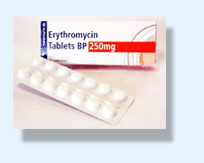Erythromycin Product Description
Erythromycin is one of the strongest antibiotics from the group of macrolide. A peculiarity of the antibiotics from this group consists in that they have better tolerance in comparison with other drugs and also rarely cause any side reactions. This is the first representative of macrolide which appeared in 1950th. Since then this drug is regarded one of the best because it quickly and effectively affects the morbific microorganisms.
In therapeutic doses this drug provides a bacteriostatic action. The pharmacological action of Erythromycin consists in that it blocks the formation of protein in bacteria which are the base for their vital functions. Also, the active components destroy the metabolic processes of aminoacids which help microbes to restore and grow better.
Taking in high doses depending on the type of the causative agent Erythromycin may show the bactericidal action. It is characterized by the affection of bacteria by means of the destruction of their cell wall. Bacteria become more sensitive to the immune system of the patient and die by several times faster. The use of the high doses is recommended only for severe infections which are not treatable by other antibiotics and pass to the stage of the relapse.
The resistance to the antibiotic develops quickly, and there is a crossed resistance with other antibiotics of the group macrolides (oleandomycin). Therefore the course of the treatment with Erythromycin drug is usually several days.
In case of the combined use with streptomycin, tetracycline, and sulfanilamide the enhancement of the action of Erythromycin is observed.
Directions for the use
- Eye infections
- Brucellosis
- Whooping cough
- Inflammation of lungs/bronchitis
- Scarlet fever
- Prostatitis
- Amebiasis/ diphtheria
- Gonorrhea
- Chlamydia
- Syphilis
- Tonsillitis
- Cholecystitis
- Furunculosis
- Peritonitis
Common Use
- Erythromycin is prescribed orally on an empty stomach
- Adults are prescribed the initial dose of 400-600 mg, then – 200-400 mg with 6-hour-interval
- For severe infections 2-3 g per day is prescribed 4-5 uses in the equal period of time.
- Children at the age of under 18 years old are prescribed the dose of 30-50 mg/kg per day, 4-5 uses in the equal period of time.
- The length of the treatment is indicated by the speed of the disappearance of the symptoms. Usually, after the fall of the disease symptoms the treatment lasts for two days. The maximal length of the treatment is 14 days.
Contraindications
- Patients with dysfunction of liver take the drug with cautions
- Erythromycin may be contraindicated in case of diagnosing jaundice, liver cirrhosis, and also individual intolerance of the medical ingredients added into the antibiotic.
- Taking the tablets they may be taken only with water. Do not take it with milk and dairy foods.
- If it is necessary to take Erythromycin in the period of the lactation, it is needed to solve the question about the temporal termination of the breast-feeding.
- The use of this drug is not recommended during pregnancy.
Possible Side effects
The most common side reactions while taking Erythromycin are:
- dyspeptic disorders (nausea, vomiting, stomachache, etc)
- dysfunction of liver
- dizziness
- insomnia.
Where to Order Erythromycin?
Order Erythromycin Online
